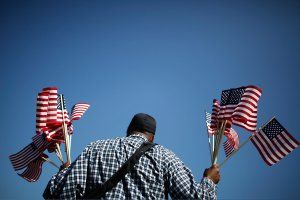
The beginning of the end of War, wrote the novelist Herman Wouk, lies in Remembrance. But what happens if Americans know so little of war that they have nothing to remember? Today, in the spring of 2010, nine years into one war in Afghanistan and seven years into another in Iraq, we are trapped in a strange moment: America is a country at war, but hardly anybody notices.
This Monday is Memorial Day. It is an editorial commonplace to lament that federal holidays, from Martin Luther King Jr.'s birthday to Veterans' Day, are now more about long weekends and department-store sales. The failure to commemorate the war dead, however, has a particularly corrosive effect on the country, for once we forget the price of combat, it becomes all too easy to allow others—and other people's children—to pay it.
In the beginning, after the Civil War, it was called Decoration Day—a practical name for a day set aside for the tending of the graves of the war dead. Gen. John A. Logan, of the Grand Army of the Republic, issued Order Number 11, calling on the country to "let no neglect, no ravages of time, testify to the present or to the coming generations that we have forgotten as a people the cost of a free and undivided republic."
But we have forgotten, and one reason is that so few of us—I include myself—have any direct connection to those who are fighting now. The military has become another country, a place where a disproportionate number of disadvantaged young Americans go to find their way. An all-volunteer force has produced a highly professional officer class, and many children of veterans enlist to carry on the tradition of their fathers. Once the burden of military sacrifice is isolated, though, the sense of responsibility that the citizens of a democracy have to be vigilant about the projection of force can grow diffuse, too. Wars become distant, casualties go little noticed.
Ironies abound. We are more hawkish as a country than we were 40 years ago. According to Gallup, the percentage of people saying that war is sometimes necessary has risen from 44 percent to 61 percent since 1971. Yet those who do the fighting make up an ever-smaller percentage of the population—less than one 10th of one percent, compared with World War II, when 9 percent were in uniform. And Americans are split on whether they would want their children to enter the military. Fifty-one percent say they would support such a decision—but a nearly equal figure, 48 percent, say they would suggest a different occupation. Afghanistan and Iraq, if they register at all, register low in surveys about the most important issues America faces.
General Logan said that we ought to guard the graves of the dead with "sacred vigilance." We should be vigilant long before the graves are dug, too—in the debates and decisions about how we project force, and who fights, and why. That is perhaps the most significant act of remembrance we can perform this Monday, and always.
A version of this essay was broadcast on "Need to Know on PBS" on May 28.
Uncommon Knowledge
Newsweek is committed to challenging conventional wisdom and finding connections in the search for common ground.
Newsweek is committed to challenging conventional wisdom and finding connections in the search for common ground.





